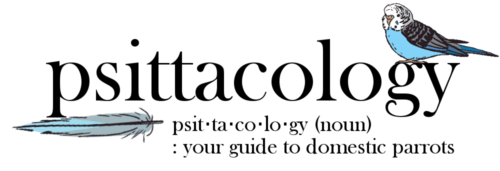Thinking about adding a lovebird (Agapornis) to your family and trying to figure out what foods to buy for your new feathered friend? Or just trying to expand your parrot’s diet? Good on you! A varied diet is one of the keys to keeping these birds happy and healthy.
Your lovebird’s diet should include regular portions of fresh fruits. Below, let’s have a look at which fruits are safe for them, plus how you should feed them. There are loads of options!
Tip: Ever heard of the Dirty Dozen™? It’s a yearly list of the fruits and vegetables found to contain the highest amounts of pesticides. If you want to feed your lovebird (or yourself, really) any of these, you’re probably best off buying organic. At the time of writing, fruits on the list include strawberries, peaches, pears, apples, and blueberries. Yikes!
Can lovebirds eat blueberries?
Absolutely. Blueberries were dubbed a “superfood” for a reason: they’re full of healthy antioxidants, vitamin C, fiber and other natural goodness. Your lovebird will love munching on a blueberry or two!
They can also have cranberries, huckleberries, currants, gooseberries, and more. Basically, all berries that are safe for humans are safe for your parrot as well. So whatever you’ve got growing in your vegetable patch, be sure to share.
Can lovebirds eat kiwi?
Yes, lovebirds can eat kiwi. Even though it doesn’t sound very nice to most of us, they can also have the skins, as long as the fruit is pesticide-free. It’s where all the nutrients are!
All types of kiwi are fine, including the sweeter gold kiwi and the tiny kiwiberry. In fact, the little black seeds may be the perfect way to convince a reluctant lovebird to try some fruit. After all, they look just like the seeds they’re used to.
Can lovebirds eat mango?
Sure, if you’re having some mango, you can share it with your lovebird. Pesticide-free mango skins are also edible, so you can leave those on if you’re offering your bird some.
I usually give my parrots the mango pit to play with and snack on. There’s always some meat left on it, and they like to scrape away every last little bit.
Can lovebirds eat apples?
Lovebirds can absolutely have a slice of apple as a treat. It will be important, though, to make sure the core is removed and that there are no seeds in the apple slice. The pips can be toxic to birds.
Apples are healthy in moderation. They contain a good bit of sugar, but also vitamin C, as well as copper, manganese, and potassium.
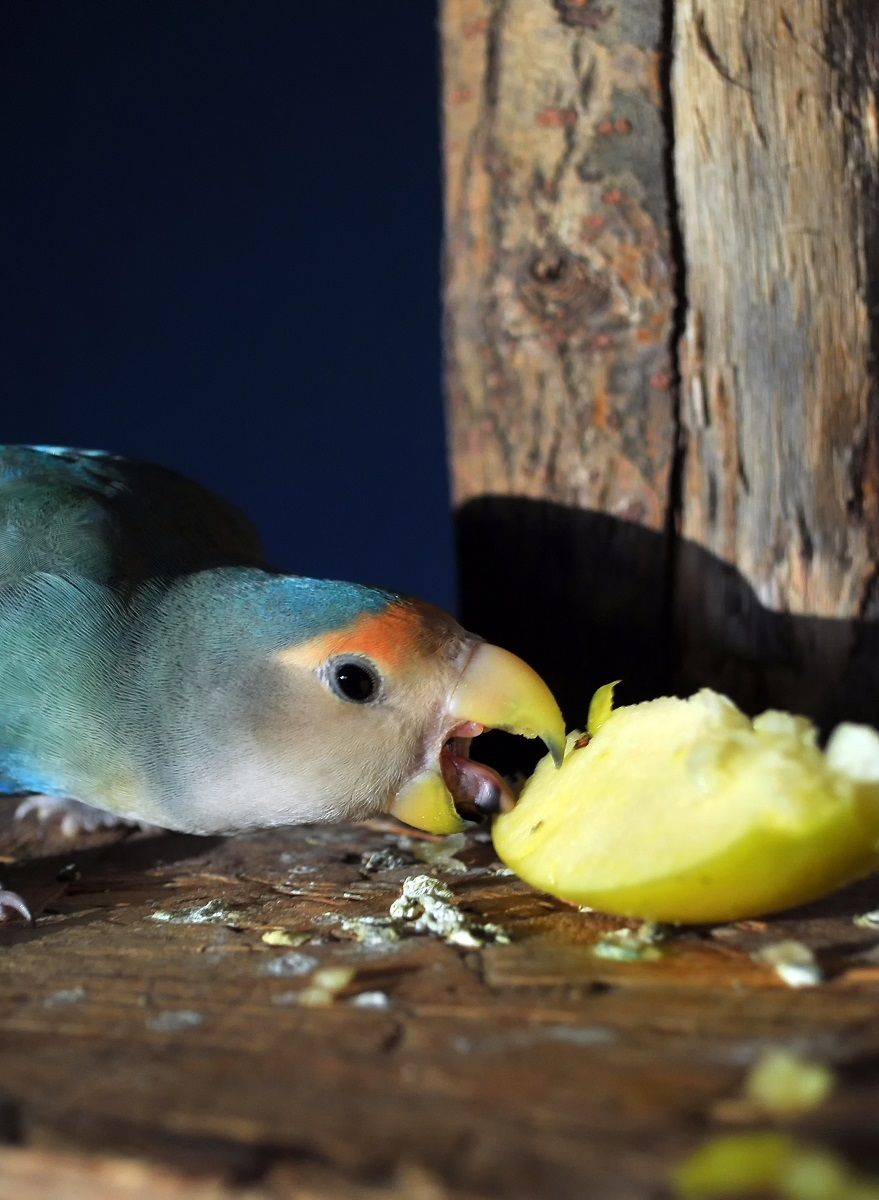
Can lovebirds eat papaya?
Yes, lovebirds can eat every part of the papaya fruit. Some sources state the seeds aren’t safe, but this isn’t true. They’re edible (and taste mildly edible). Do make sure the papaya is fully ripe. In unripe fruits, the skin in particular contains latex, which can cause stomach issues.
There are loads of different papaya varieties for you and your parrot to try together!
Can lovebirds eat peaches?
Yes, peaches, plus their nectarine cousins, are safe for lovebirds. Your bird might appreciate the juicy texture. If you bought organic peaches, the skin can be left on.
Although it seems unlikely for a lovebird to be able to crack a peach stone, the pits should be removed before feeding. All stone fruit pits contain a compound that’s converted to cyanide by the body, making them toxic.
Can lovebirds eat pears?
Sure! Your lovebird can have some pear just fine. Consider buying organic and leaving the skin on, as it’s high in fiber and contains a bunch of nutrients that are great for our feathered friends.
As with stone fruits, pear pits should be removed before feeding. One or two pits are unlikely to cause your bird to drop dead, but it’s always better to be safe than sorry.
Can lovebirds eat oranges?
Lovebirds can eat citrus fruits like oranges and tangerines in moderation. They are full of Vitamin C, which helps support a healthy immune system. They even have properties that have been linked to improving heart health in both humans and animals!
Remember to peel oranges and tangerines before giving them to your bird, as the outside of the fruit may have been exposed to pesticides that can be harmful to birds.
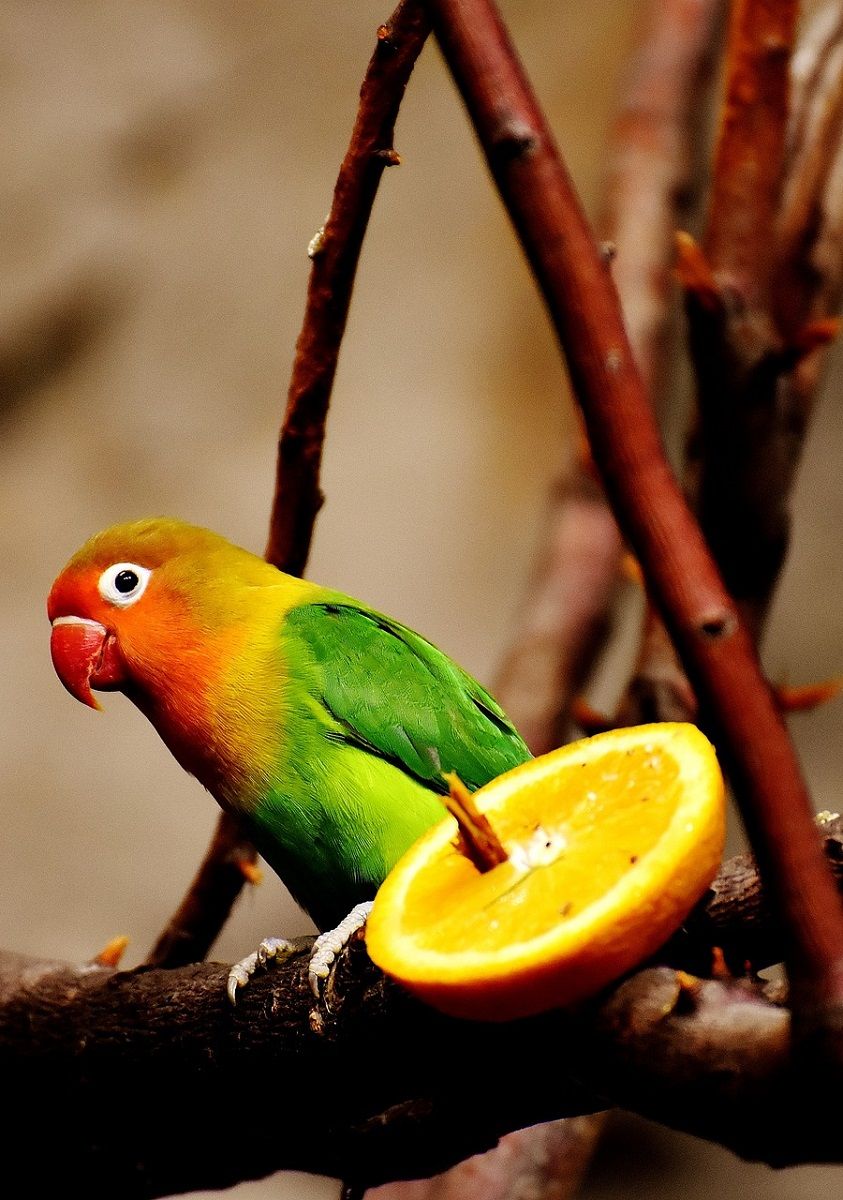
Can lovebirds eat pineapple?
Yes, parrots can eat every part of a pineapple, though you’re best off peeling this fruit if it’s not organic. If it is organic, even the leaves are technically safe, and your lovebird might enjoy chewing them up. The core is also fine, as is the skin.
Go easy on the pineapple if your lovebird has never had any, as it is quite acidic. It also contains an enzyme called bromelain, which can cause an upset tummy in large amounts.
Can lovebirds eat guava?
Whether white, pink or yellow, any type of guava is fine for your lovebird to have. Organic guava can be fed with the skin on, and there’s no need to remove the seeds. No part of this fruit is toxic to birds.
Did you know? Parrots LOVE guava. Indian ringneck parrots, for example, wreak absolute havoc on guava orchards in India and beyond.
Dulera, 2022
Can lovebirds eat blackberries?
All berries make great treats for lovebirds, but they certainly can be messy! Don’t worry if your parrot ends up looking like it just committed a murder. You can give it a bath later.
Despite the mess, blackberries especially have amazing nutritional value for lovebirds. They are packed full of vitamins like vitamin C and vitamin K. They also contain manganese, which helps lovebirds better metabolize their food.
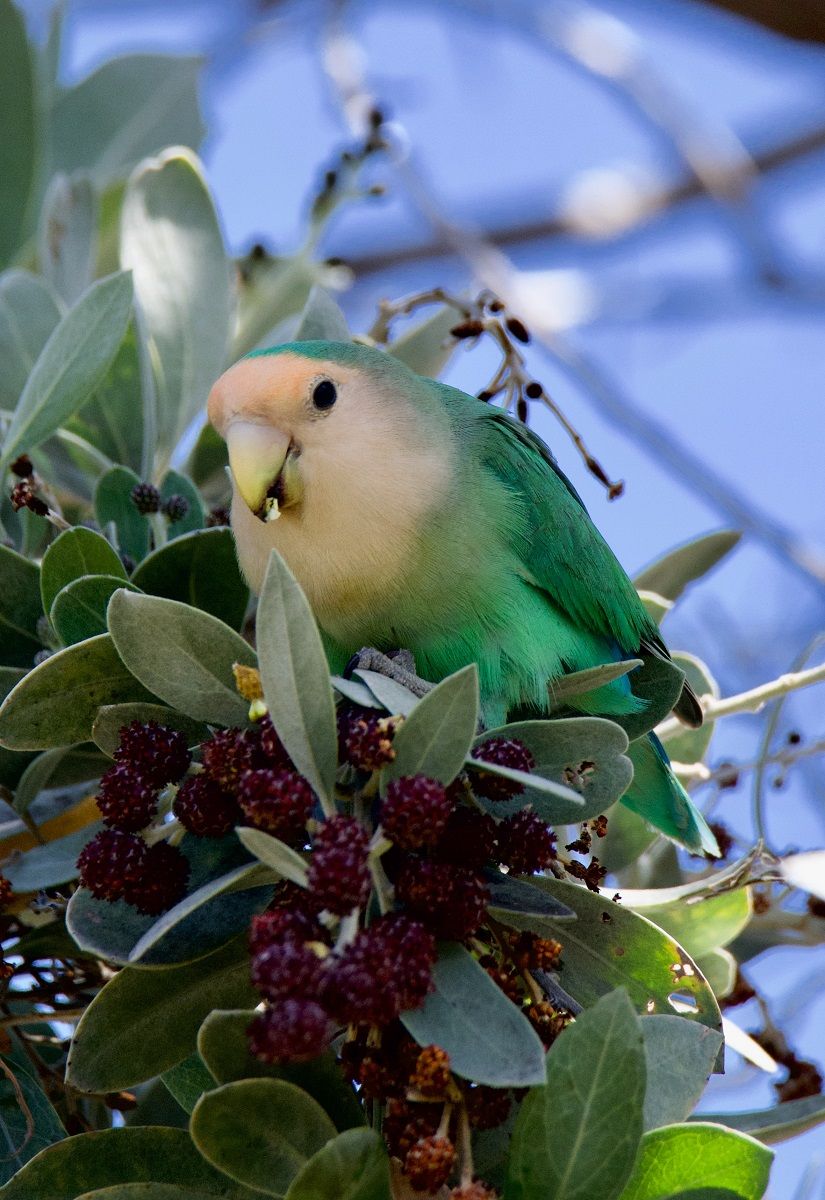
Can lovebirds eat coconut?
Fresh coconut can be an especially tasty treat for lovebirds. Because it does have a high fat content, it should be only served in moderation, but if you’ve just cracked one open it’s fine to share a little.
Remember to avoid coconut cream or coconut with added artificial sweeteners. Dehydrated and desiccated coco are fine in small amounts, as long as they’re sugar-free.
Can lovebirds eat watermelon?
Yes, lovebirds can eat watermelon and its seeds. Watermelon is full of vitamins like vitamins A, B1, and C.
Just be sure to remove the rind, as this part of the watermelon is more likely to have been exposed to pesticides and other such chemicals. If you bought organic, you can leave it on, as it is technically edible.
Can lovebirds eat bananas?
Peeled bananas are a delicious treat for lovebirds and are often a fan favorite! They are rich in potassium and fiber, which help to promote digestive health. Bananas can be served in their raw form, either sliced up or mashed.
Plantains are also a beneficial treat for lovebirds. However, it’s best to cook them by boiling in water before serving, as they can be a little difficult to digest in their raw form.
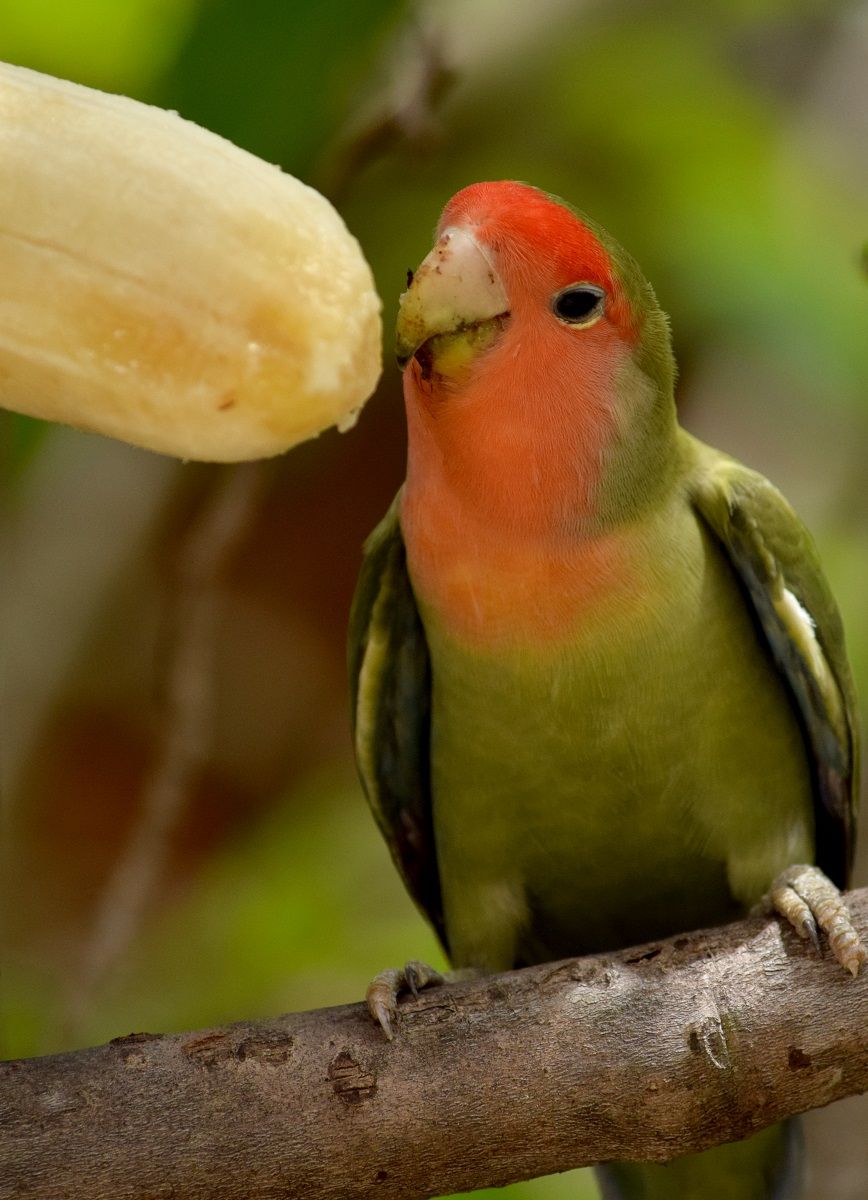
Can lovebirds eat cherries?
Lovebirds can eat cherries so long as the pits have been removed. This is because stone fruit pits are actually toxic, although luckily a small parrot like an Agapornis won’t be able to crack them and reach the dangerous bits.
All types of stone fruit including cherries, are safe for your parrot as long as the pits are removed. Other examples of stone fruit include peaches, plums, apricots, nectarines, and mangoes, just to name a few. Most are a bit high in sugar, but our birds adore them.
Can lovebirds eat grapes?
Grapes are a healthy treat for lovebirds, though they are best served in moderation due to their sugar content. They contain nutrients like vitamins B1, B6, C, and K.
Grapes also have various anti-inflammatory properties that can help decrease the risk of various diseases and ailments.
Lovebirds can also eat raisins, which are dried grapes. However, when feeding dried fruit, it’s important to look for a brand that has no added sulfites or sugar.
Can lovebirds eat strawberries?
Strawberries can be a really healthy occasional treat for lovebirds. Because of their sugar content, they should only be served sparingly, but they do offer other nutritional benefits. They contain vitamins C and K, as well as potassium.
Strawberry tops also make a great lovebird snack. They’re lower in sugar and calories than the actual berries and contain lots of micronutrients. Offer them to your feathered friend rather than throwing them out!
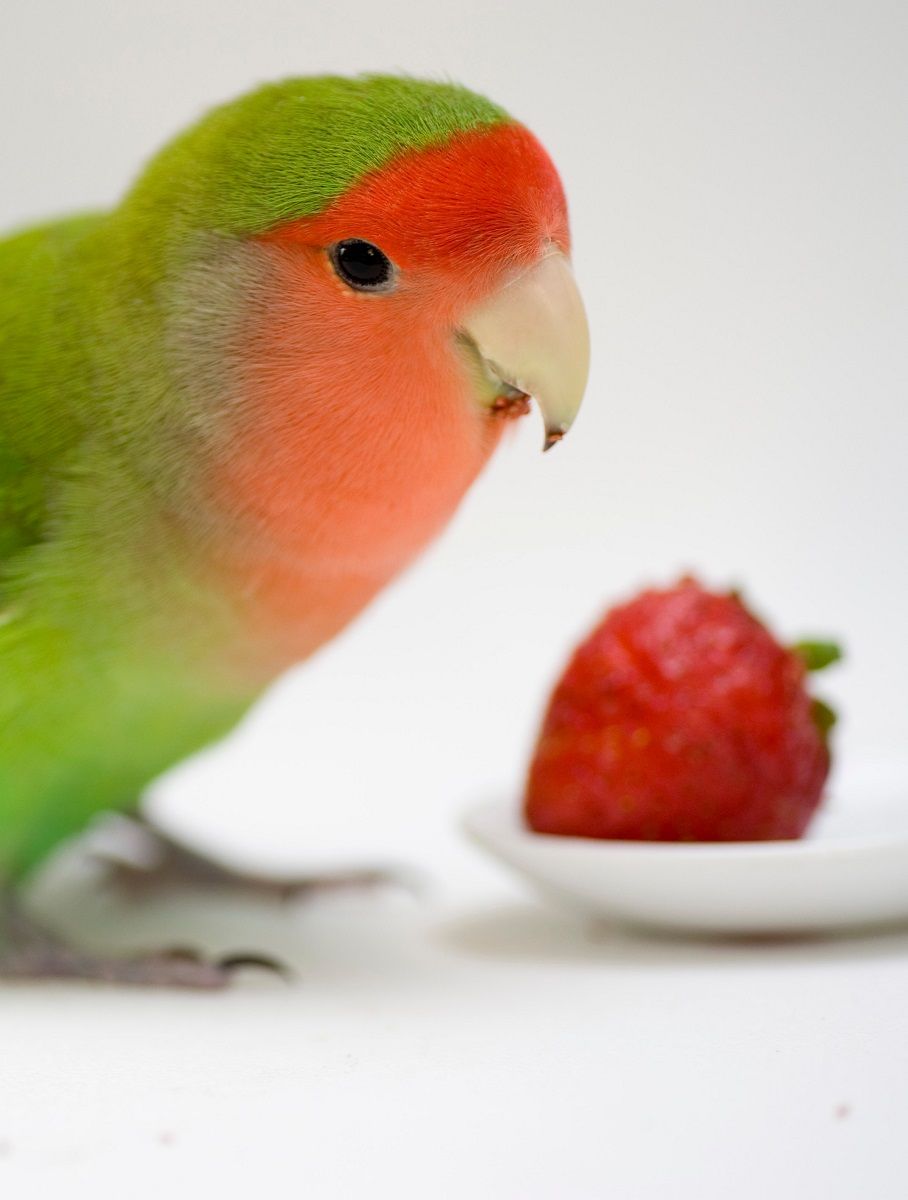
Can lovebirds eat pomegranate?
If you don’t mind your lovebird getting a bit dirty, then yes, it can absolutely have some pomegranate. They tend to love the juicy seeds, though things do tend to get a bit messy.
The skins and flesh (the white bits) of a pomegranate are also safe for parrots to eat. If your lovebird is used to foraging, you can expose some of the seeds and then let it open the rest of the fruit itself. Hours of fun guaranteed!
Can lovebirds eat cantaloupe?
Like watermelon, cantaloupe is safe for lovebirds. In fact, all melons are: honeydew, galia, horned melon, bitter melon, piel de sapo… you name it, your bird can eat it.
It’s not just the flesh that’s good for your lovebird either. Melon seeds are also 100% safe. If the melon is organic, so is the rind, although your bird may be more interested in chewing on it than actually consuming it.
Unsafe fruits for lovebirds
Can lovebirds eat avocado?
No. Although some folks have offered their parrots avocado or guacamole seemingly without ill effects, the persin they contain is toxic to most animals. This includes birds.
Can lovebirds eat rhubarb?
Okay, okay – rhubarb is technically a vegetable. I’ve included it here because it’s usually eaten as a fruit, like in desserts.
Your lovebird can eat boiled rhubarb as long as it doesn’t have added sugar, but it’s important not to offer the stalks or leaves in their raw form. They’re very high in oxalic acid, which is guaranteed to majorly upset your bird’s stomach.
Can lovebirds eat lemon?
Because lemons (and limes, and the like) are so acidic, it’s best to find something else to offer your lovebird. These citrus fruits can cause stomach upset in parrots.
Why not go for one of their milder cousins, like oranges or tangerines, instead? Chances are your lovebird wouldn’t like the tart taste of lemon and lime anyway!
FAQ
Well, technically they can, but it’s not something I’d recommend. Canned fruit is nearly devoid of nutrients and tends to be almost pure sugar. Not a great addition to your parrot’s diet compared to fresh fruits!
Conclusion
Lovebirds can and should eat regular servings of fresh fruit. Fruits contain loads of healthy micronutrients, and they’re a great way to keep mealtimes fun and exciting! Offer fruit whole, in small pieces, or skewered on a fruit kabob.
If your lovebird is apprehensive about sampling new foods, just keep trying. You can find more information about what you can feed a parrot in the full post on parrot diet, which should be helpful in putting together your lovebird’s daily meals.
If you’d like to know more about lovebirds, the different species and their care, have a look at Psittacology’s full lovebird category.
If you have any more questions about fruits for lovebirds or if you’d like to share your own experiences with these colorful little parrots, don’t hesitate to leave a comment below!
Sources
Dulera, J. G., & Nayi, A. H. (2022). Assessment of rose-ringed parakeet (Psittacula krameri) Depredations to Guava Fruits. Pharm Innov, 11(7), 2825-2829.
Hargis, A. M., Stauber, E., Casteel, S., & Eitner, D. (1989). Avocado (Persea americana) intoxication in caged birds. Journal of the American Veterinary Medical Association, 194(1), 64-66.
